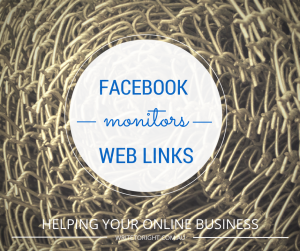 In the news this week, Facebook has announced two major changes to how it ranks the links pages share.
In the news this week, Facebook has announced two major changes to how it ranks the links pages share.
CHANGES
The first is the practise of ‘click-baiting’. Click-baiting is where a business will share a link to a website, but do not include descriptive or useful information about the linked page in the Facebook post. The example Facebook used was of a gossip magazine, linking to their website; the description did not accurately describe what the readers would find (they used a vague outline) and the associated photo didn’t provide any clues.
Their research has showed, the not so surprising finding, that people find this practise misleading and it was therefore unpopular with users. With this in mind they will be monitoring how long people stay on the linked page and then rank the associated Facebook post accordingly. The longer people stay on the linked page (indicating that it is interesting) the greater the ranking it will receive and more likely it will be to appear in Newsfeeds. Should the link and post be misleading (meaning people quickly follow the link and realise it’s not what they were expecting to see and leave) then the post will not be highly ranked by Facebook and it is unlikely to appear in the Newsfeed.
The second change was how Facebook would rank the way businesses posted links.
Some businesses will paste a link into their post from a website and then allow Facebook to display the associated image and description in the post. This is how I share links and I have previously described how doing this is beneficial to your page.
Other businesses will paste the link into a photo post, where they have uploaded a photo and then add the link into the description.
Facebook has done some research and found that the majority of users will click through when the business shares a link with the associated site information, rather than those who add it as a photo description.
WHAT DOES IT ALL MEAN
For businesses who use click-baiting, you will see a decline in your reach. What I would encourage businesses to do is to be honest, accurate, and sociable. Your Facebook page is there to build a relationship. I mentioned last week that researchers believe it takes five touches to gain a customer, so use your touches wisely. Think about your core beliefs, I discussed this in finding your online voice, and if honesty/integrity/truth are on your list then click-baiting shouldn’t be in your tool box.
I admit, that before reading this Facebook article, I often deleted the link address from my posts as I thought they looked ‘ugly and clunky’. I am now leaving the links in, as a little extra information. I used to use link shortening, my website even has it as an add-on (I also used Bitly), as a way to provide the link for mobile devices (and to make my posts look tidier). I am going to rethink using shot links. If you prefer the look of the shorter links, try editing the link to provide a more meaningful link than the randomly generated list of letters and numbers.
What it means for your website content will ultimately depend on the platform you use. Both of my sites are WordPress, so my products, pages and posts all have: at least one image (I don’t always set them as featured), and a meta-description.
I use Yoast for my SEO and a recent addition to the tool is the ability to add a Social Media description. This description, as you can imagine, is what is displayed when you link to that item on a social media platform (like Facebook). Ordinarily Facebook will take the first few lines of your content and add it as a description, with the image, when you upload a link. If you specify a meta-description, it will use this data instead of the first few lines. If you use Yoast’s Social description, it will use this data. This is handy as you can then tailor your descriptions for your audience and/or SEO.
Write to Right offer website health checks, where one of the tasks is to check the meta-descriptions on your pages/products. Now that you have read about how you can use this information to benefit your business and would like to know more about how Write to Right can help, please use the contact form and we can discuss your needs.


Very interesting Tara. Sometimes you have to feel sorry for Facebook in trying to police in favour of the public the way that some people/businesses conduct themselves. Thanks for the SEO tips as well.
Hi Judy
I agree, if as business page owners we find it frustrating to keep up, I can only imagine driving the changes and monitoring behaviours.
Glad you enjoyed the tips.
Kara
O that is interesting. I always delete the link – although I’m pretty confident I’m not misleading. Might have to change my habits.
Hi Amy
If you are providing an accurate description, then you won’t be misleading. The other issue about deleting the link is that Facebook will now leave it in.
Thats was interesting and easy to understand post Kara. I understand very little about Facebook and can never work out what should be going where. I seem t get to grips with something then they change it This was the clearest explanation on click baiting I have read, thank you.
Hi Rosanne
I’m glad that I was able to clearly explain click-baiting.
I agree, things are constantly changing.
This is really useful Kara. I didn’t know about the Social media description in Yoast even though I use it a lot. Off to check it out now x
Hi Debbie,
only too happy to help.
I only noticed the changes, to Yoast, last week.
Excellent post Kara!
Thanks Jane.
Oh now this is very interesting had a lot of problems trying to contact facebook .x
Hi Hannah
only too happy to help.
It’s really hard to keep up with Facebook but I do believe that they are trying to simplify and improve the user e.xperience and as such if we don’t try to cheat the system that businesses will profit from improved engagement and more targetted reach.
Like you, I used to delete the links to make the post ‘tidier’ but wiill perhaps leave them in to see if it improves my reach.
It’s really hard to keep up with Facebook but I do believe that they are trying to simplify and improve the user experience and as such if we don’t try to cheat the system that businesses will profit from improved engagement and more targeted reach.
Like you, I used to delete the links to make the post ‘tidier’ but will perhaps leave them in to see if it improves my reach.
Hi Rachel
I agree, I believe that they are improving the user experience (and as a user I am grateful). I do hope to help business to make the most (as you say cheat) of the changes.
Let me know how you go with your reach by keeping the links in.
Kara
Thanks for the update – that’s really useful. I usually add a link to a photo post so I’ll just do a link now 🙂
Really interesting Kara. The Social Media description in Yoast seems like a useful tool to have so I’ll check that out.